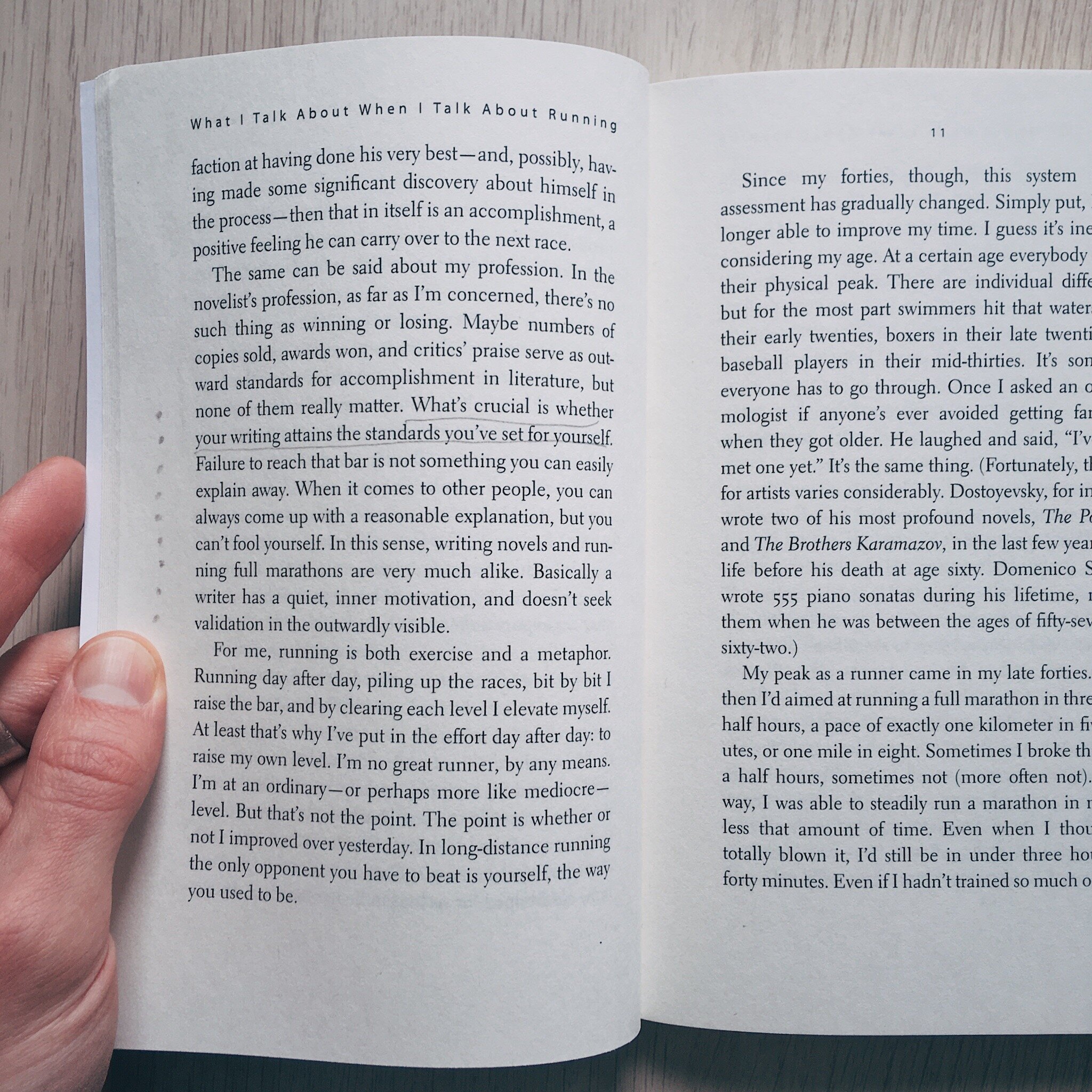What I Talk About When I Talk About Running by Haruki Murakami
The Book in Three Sentences
Writing and running marathons are very much alike: a writer has a quiet, inner motivation, and doesn’t seek validation in the outwardly visible. Exerting yourself to the fullest, within your individual limits, is the essence of running and a metaphor for life. Murakami shares the lessons he has learned in life, and how he releases them as a part of the storyline in his novels.
Building a Rhythm
“Right now I’m aiming at increasing the distance I run, so speed is less of an issue. As long as I can run a certain distance, that’s all I care about. Sometimes I run fast when I feel like it, but if I increase the pace I shorten the amount of time I run, the point being to let the exhilaration I feel at the end of each run carry over into the next day. This is the same sort of track I find necessary when writing a novel. I stop every day right at the point where I feel I can write more. Do that, and the next day’s work goes surprisingly smoothly. I think Ernest Hemmingway did something like that. To keep on, you have to keep the rhythm. This is the important thing for longterm projects. Once you set the pace, the rest will follow. The problem is getting the flywheel to spin at a set speed—and to get to that point takes as much concentration and effort as you can manage.” (pp4–5)
Note: Jim Collins published a book in 2019 called Turning the Flywheel
In a private correspondence, the great mystery writer Raymond Chandler once confessed that even if he didn’t write anything, he made sure he sat down at his desk every single day and concentrated. This is the way Chandler gave himself the physical stamina a professional writer needs, quietly strengthening his willpower. (p79)
The writing process—sitting at your desk, focusing your mind like a laser beam, imagining something out of a blank horizon, creating a story, selecting the right words, one by one, keeping the whole flow of the story on track—requires far more energy, over al long period, than most people ever imagine. (p79)
One of my basic rules of training: I never take two days off in a row. (p71)
Writing and Running
“The same can be said about my profession… as far as I’m concerned, there’s no such thing as winning or losing… What’s crucial is whether your writing attains the standards you’ve set for yourself. Failure to reach that bar is not something you can explain away. When it comes to other people, you can always come up with a reasonable explanation, but you can’t fool yourself. In this sense, writing and running marathons are very much alike. A writer has a quiet, inner motivation, and doesn’t seek validation in the outwardly visible.” (p10)
Writing and Business
I’m the kind of person who has to totally commit to whatever I do. I just couldn’t do something clever like writing a novel while someone else ran the business. I had to give everything I had. If I failed, I could accept that. But I knew if I did things halfheartedly and they didn’t work out, I’d always have regrets. (p31)It didn’t matter if nine out of ten didn’t like my bar. This realization lifted a weight off my shoulders. Still, I had to make sure that the one person who did like the place really liked it. I had to make my philosophy and stance clear-cut and patiently maintain that stance no matter what. This is what I learned through running a business. (p38)
Why I Run
What exactly do I think about when I’m running? I don’t have a clue. On cold days I think a little about how cold it is. And about the heat on hot days. When I’m sad I think a little about sadness. When I’m happy I think a little about happiness. As I mentioned before, random memories come to me too. And occasionally, hardly ever, really, I get an idea to use in a novel. I just run. I run in a void. Or maybe I should put it the other way: I run to acquire a void. (p17)
The thoughts that occur to me while running are like clouds in the sky. Clouds of all different sizes. They come and they go, while the sky remains the same sky as always. (p17)
Note: The “clouds covering the sky” analogy is used in the meditation app Headspace
When I’m criticized unjustly (from my viewpoint, at least), or when someone I’m sure will understand me doesn’t, I go running for a little longer than usual… One of the results of running a little further than usual is that I become that much stronger… If I have a frustrating experience, I use that to improve myself… I quietly absorb the things I’m able to, releasing them later, and in as changed a form as possible, as part of the storyline in a novel. (p20)
Most runners run not because they want to live longer, but because they want to live life to the fullest. If you’re going to while away your years, it’s far better to live them with clear goals and fully alive than in a fog, and I believe running helps you do that. (pp82–83)
Exerting yourself to the fullest within your individual limits: that’s the essence of running, and a metaphor for life—and for me, for writing as well. I believe many runners would agree. (p83)
Long-distance running (more or less, for better or worse) has moulded me into the person I am today, and I’m hoping it will remain a part of my life for as long as possible. (p173)
I’m afraid training for an Ironman or Ultramarathon would (most definitely) take so much time out of my schedule it would interfere with my real job. For me, the main goal of exercising is to maintain, and improve, my physical condition in order to keep on writing novels. So if races and training cut into the time I need to write, this would be putting the cart before the horse, which is why I’ve tried to maintain a decent balance. (pp177–178)
Slow and Steady
To be able to grasp something of value, sometimes you have to perform seemingly inefficient acts. (172)
I’ve been steadily working on these essays on running, though nobody asked me to. Just like a silent village blacksmith, tinkering away. (p72)
I didn’t write this book in one stretch, but rather a little at a time, whenever I could find free time in between other work. It took a long time to finish, and even more after I’d finished to carefully polish and rework it. (p175)
Growing Older
Even if my time in races doesn’t improve, there’s not much I can do about it. I’ve gotten older, and time has taken its toll. It’s nobody’s fault. Those are the rules of the game. Just as the river flows to the sea, growing older and slowing down is just part of the natural scenery, and I’ve got to accept it. (p22)
Competing against time. What’s going to be much more meaningful to me now is how much I can enjoy myself, whether I can finish twenty-six miles with a feeling of contentment. (p120)
You make due with what you have. As you age you learn to be happy with what you have. That’s one of the few good points of growing older. (p86)


